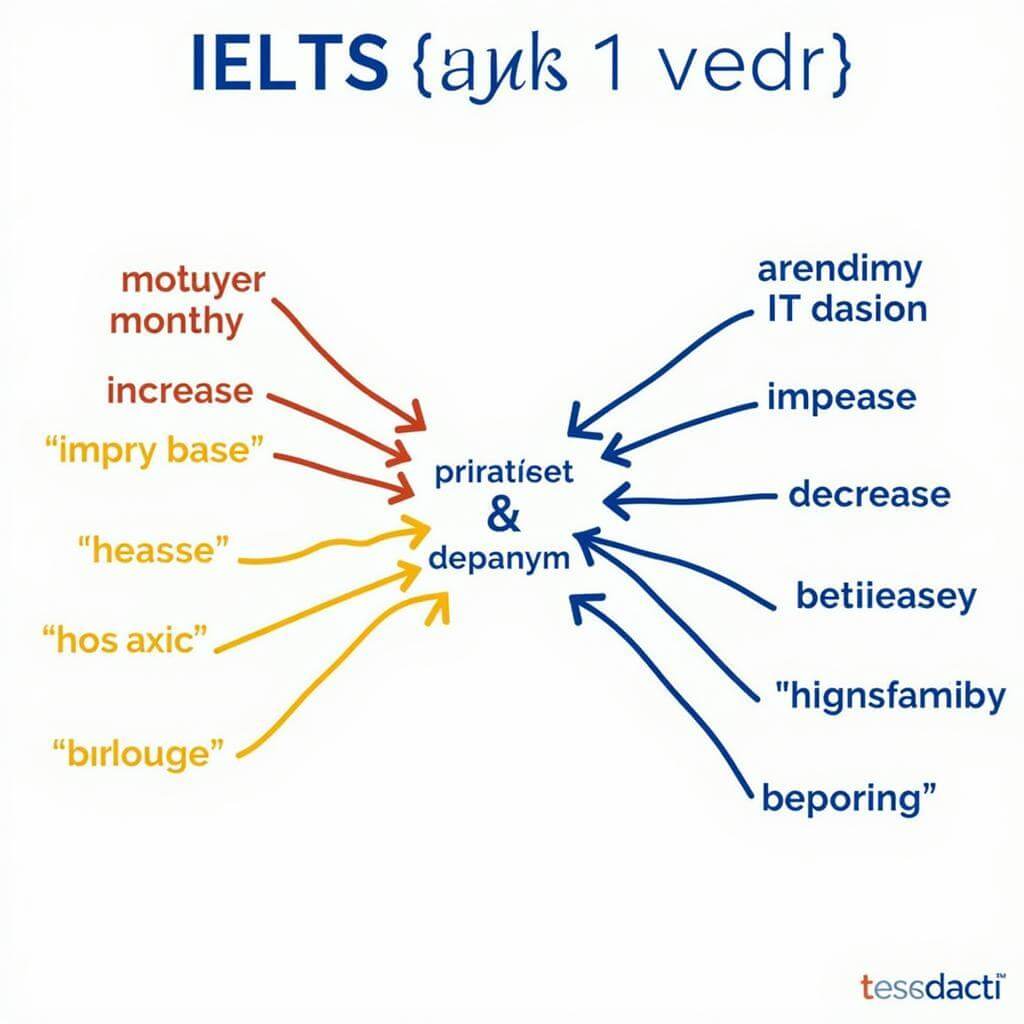IELTS Writing Task 1 can be challenging, especially when it comes to using appropriate vocabulary. This guide will help you enhance your lexical resource for Task 1, enabling you to express ideas more precisely and boost your band score. Let’s explore effective strategies to improve your vocabulary for IELTS Task 1 writing.
Understanding the Importance of Vocabulary in IELTS Task 1
Before diving into specific techniques, it’s crucial to recognize why vocabulary matters in Task 1. A rich and varied vocabulary allows you to:
- Describe data and trends accurately
- Avoid repetition and demonstrate language proficiency
- Convey information clearly and concisely
- Impress examiners with your lexical resource
Improving clarity in task 1 reports is essential, and expanding your vocabulary is a key step towards achieving this goal.
Strategies to Enhance Your Task 1 Vocabulary
1. Master Topic-Specific Terminology
Different types of Task 1 questions require specific vocabulary sets. Focus on learning terms related to:
- Graphs and charts (e.g., fluctuate, peak, plummet)
- Maps and diagrams (e.g., adjacent, relocate, expand)
- Processes (e.g., commence, subsequent, culminate)
Dr. Emma Thompson, an IELTS expert with 15 years of experience, advises: “Familiarize yourself with at least 10-15 specific terms for each Task 1 question type. This will give you a solid foundation for tackling any task confidently.”
2. Develop a Range of Synonyms
To avoid repetition and demonstrate lexical variety, build a repertoire of synonyms for common Task 1 words. For example:
- Increase: rise, grow, climb, surge
- Decrease: decline, fall, drop, plunge
- Significant: substantial, considerable, noteworthy

3. Use Precise Verbs and Adjectives
Instead of relying on generic terms, opt for more specific and descriptive words. For instance:
- “Increased slightly” → “Edged up”
- “Decreased rapidly” → “Plummeted”
- “Big difference” → “Stark contrast”
4. Incorporate Academic Collocations
Collocations are words that naturally go together. Using them correctly can significantly improve your writing style. Some examples include:
- Sharp increase/decrease
- Gradual decline/rise
- Marked improvement/deterioration
5. Learn to Paraphrase Effectively
Paraphrasing is a crucial skill for Task 1, allowing you to restate information using different vocabulary. Practice rephrasing sentences while maintaining their original meaning.
Improving coherence in task 1 essays is closely linked to effective paraphrasing and vocabulary use.
6. Utilize Comparison and Contrast Language
Task 1 often requires comparing and contrasting data. Familiarize yourself with phrases like:
- In contrast to
- Compared with
- While X, on the other hand, Y
7. Master Approximation Language
When describing figures that aren’t exact, use approximation vocabulary:
- Approximately
- Roughly
- In the region of
- Just over/under
Practical Exercises to Boost Your Task 1 Vocabulary
-
Word Mapping: Create mind maps for different Task 1 topics, branching out related vocabulary.
-
Synonym Substitution: Take a sample Task 1 response and challenge yourself to replace common words with more sophisticated alternatives.
-
Collocation Matching: Practice matching verbs, nouns, and adjectives to form correct collocations used in Task 1 descriptions.
-
Paraphrasing Drills: Rewrite Task 1 introductions and overviews using different vocabulary while maintaining the same meaning.
-
Gap-Fill Exercises: Remove key vocabulary from sample answers and try to fill in the blanks with appropriate words.
Common Pitfalls to Avoid
While expanding your vocabulary is crucial, be wary of these common mistakes:
- Overusing complex words inappropriately
- Neglecting accuracy for the sake of impressive vocabulary
- Ignoring context when choosing synonyms
- Using informal or colloquial language
Dr. Sarah Lee, IELTS Writing examiner, warns: “Don’t sacrifice clarity for complexity. It’s better to use simpler words correctly than to misuse advanced vocabulary.”
Integrating New Vocabulary into Your Writing
Learning new words is just the first step. To truly improve your Task 1 writing:
- Practice using new vocabulary in context regularly
- Review and revise your expanded vocabulary list periodically
- Analyze high-scoring sample answers to see how advanced vocabulary is used effectively
- Get feedback on your writing to ensure you’re using new words correctly
Using varied sentence structures in task 2 can also help you incorporate new vocabulary more naturally in your writing.
Conclusion
Enhancing your vocabulary for IELTS Writing Task 1 is a gradual process that requires consistent effort and practice. By focusing on topic-specific terminology, developing a range of synonyms, and mastering academic collocations, you can significantly improve your ability to write clear, precise, and impressive Task 1 responses. Remember, the goal is not just to use complex words, but to use the right words in the right context to effectively communicate information and trends.
FAQ
How many new words should I learn for IELTS Task 1?
Aim to learn at least 50-100 new words or phrases specifically for Task 1, focusing on those that describe trends, comparisons, and data representation.
Can I use idioms in IELTS Writing Task 1?
While idioms can enhance your writing in Task 2, they are generally not appropriate for the formal, academic nature of Task 1. Stick to precise, factual language instead.
How can I remember new vocabulary effectively?
Use spaced repetition techniques, create flashcards, and most importantly, practice using new words in context through regular writing exercises.
Is it better to use simple or complex vocabulary in Task 1?
A mix of both is ideal. Use simple words for clarity and complex vocabulary to demonstrate range, but always prioritize accuracy and appropriateness.
How can I practice using new Task 1 vocabulary?
Regularly describe graphs and charts you encounter in daily life, such as in newspapers or reports, using the new vocabulary you’ve learned.